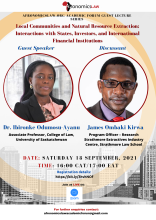The fact remains that despite some welcome relationship building between Africa and the Caribbean in the past few years, the global trade and investment landscape is not always conducive to bloc thinking. Historical and cultural ties are intangible and important building blocks of any relationship, and it has led to a level of respect between regions and negotiators over the years that have to be acknowledged. But what happens when commerce overtakes culture and investment opportunities overtake history? The act of multilateral negotiation has never truly confronted how the inequities of the real world are brought to the negotiating table. It will have to address that, as developing countries themselves will need to start framing a response to what happens when the competition of the real world also impacts their well-curated solidarity.
